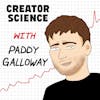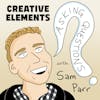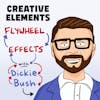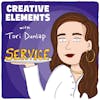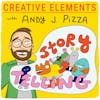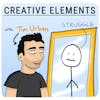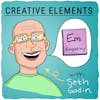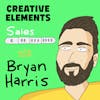
#121: Bryan Harris – How this sales master grew his business $100K/month
Play EpisodeBryan Harris is the founder and CEO of Growth Tools, a monthly coaching service that makes it nearly impossible to fail at growing your online business.
WATCH
▶️ Watch this episode on YouTube
***
EPISODE DESCRIPTION
Bryan Harris is the founder and CEO of Growth Tools, a monthly coaching service that makes it nearly impossible to fail at growing your online business. They combine proven growth playbooks with 1:1 coaching and peer support so you’re never overwhelmed, stuck, or left wondering what to do next.
Not only does Growth Tools offer a 100% refund, but he'll even give you $1,000 on top of that to hire another coach.
In this episode, you’ll learn how to get people to take action, how Bryan sells a $15,000 coaching program, what makes a sales offer irresistible, and an entirely new pricing model that increased Bryan’s monthly earnings $100K per MONTH.
Full transcript and show notes
Join the Growth Tools VIP list (free)
Follow Bryan Harris on Twitter / YouTube
TIMESTAMPS
00:00 - What If You Could Earn an EXTRA $100K per month?
00:37 - Bryan Sold Baseball Cards Out of His Bedroom Window
01:09 - Bryan’s First Company Video Fruit
01:59 - What You’ll Learn Today
02:43 - 9 Year Anniversary of Bryan Quitting His Job
03:47 - Being On a Constant Mission to “Figure It Out”
05:51 - Bryan Started Making Content
06:56 - The Growth Tools Flywheel
07:22 - Bryan Zigs When Others Zag
07:56 - The Mission to Scale 1-on-1 Coaching
11:02 - What You Need To Do To Consistently Produce Results
13:19 - People Fail Because They Lose Belief In Their Plan
17:04 - Why Do People Lose Belief In Their Plan?
21:26 - Who is Bryan’s PERFECT Client?
24:26 - The BEST Business Framework I’ve EVER Heard Of
27:58 - It’s Depressing There is Only ONE Elon Musk
29:31 - Elon Musk vs Mark Cuban
30:13 - Bryan’s 20 Year Problem
34:22 - What Makes an IRRESISTIBLE Sales Offer?
39:59 - How to Make an Effective High-Ticket Offer
44:26 - How Bryan Added an EXTRA $100K in Revenue PER MONTH
51:33 - Clients Leaving is a BUG Not a Feature
53:25 - Should You Use Software for Lead Generation?
***
CONNECT
🙏 Make a guest or mailbag request
📝 Check out our curated Playlists
***
SPONSORS
💼 View all sponsors and offers
***
SAY THANKS
💜 Leave a review on Apple Podcasts
***
PODGLOMERATE NETWORK
This show is a part of the Podglomerate network, a company that produces, distributes, and monetizes podcasts. We encourage you to visit the website and sign up for our newsletter for more information about our shows, launches, and events. For more information on how The Podglomerate treats data, please see our Privacy Policy.
Since you're listening to Creative Elements, we'd like to suggest you also try other Podglomerate shows surrounding entrepreneurship, business, and careers like Rocketship.fm and Freelance to Founder.
Learn more about your ad choices. Visit megaphone.fm/adchoices
Bryan Harris 00:00
You don't need to make any more content. You don't need to add more training modules onto your thing to go high ticket. You need more access and more perks. That's the thing that people pay exponentially more for you already do that you don't even knew it.
Jay Clouse 00:12
Hello, my friend. Welcome back to another episode of Creative Elements. What if you could earn an additional $100,000 per month with no changes other than your pricing model? That's more than $1 million per year. And that's exactly what today's guest Bryan Harris did with his business this year. Bryan is the founder and CEO of Growth Tools, a coaching program that guarantees to help you grow your business, not only they offer a refund, but if you're not satisfied, they will give you $1,000 back on top of that. I have never heard of a refund policy like this. And that is why I like following Bryan Harris and his work. He always does things differently with his business. And he's sharing the results. And he tells me that this goes all the way back to his childhood.
Bryan Harris 00:54
So I've been on a probably quest since I was four years old. I mean, my brother started a baseball card shop out of our bedroom window in Mobile Alabama selling baseball cards and getting ripped off from our Bo Jackson rookie card from our favorite on the street, all the way through my my parents do an Amway and making websites in 1998 and everything in between trying to find like, what's my thing? What am I going to make it help people with?
Jay Clouse 01:15
I've been following Bryan since 2017, when his business was called Video fruit. It was a video production agency. And despite a lot of success and some really legitimate clients, he moved away from the agency model.
Bryan Harris 01:27
Video fruit was the original name of the company it was because we made videos for people Kissmetrics Neil Patel and Heaton Shah was the first time ever had and you can still go to the Kissmetrics YouTube channel and see the really crappy, bad haircut Brown Harris on there talking about stuff he didn't know anything about. And making videos for people eventually had a side running an agency is something I have zero desire to do. Making videos for other people is not fun. So I made a course back in this is in 2013 when making courses was not easy. It was around but you know, I made the course sold 20 or so copies to friends and family and Facebook groups I was in and then realize like, I gotta figure out, like, how do you sell stuff to people on the internet that don't know who you are.
Jay Clouse 02:04
That's what drew me to Bryan. He was writing the most in depth practical articles about how he was getting more email subscribers selling his courses, all the same things that we're talking about today, but five years ago. So in this episode, you'll learn how to get people to take action, how Bryan sells a $15,000 coaching program. What makes a sales offer irresistible, and a brand new pricing model that increased Bryan sales $100,000 per month. I'd love to hear your thoughts on this episode. As you listen, you can find me on Twitter or Instagram @jayclouse tag me, let me know that you're listening. And if you're here on YouTube, leave a comment down below and hit subscribe if you have not already. Alright, that's enough for me. Let's talk with Bryan.
Bryan Harris 03:00
Here's a fun fact. Today is the nine year anniversary of me quitting my job and going full time to the company.
Jay Clouse 03:07
Oh, wow.
Bryan Harris 03:07
Today, yeah.
Jay Clouse 03:08
Congrats.
Bryan Harris 03:09
So video, fruit was the start of the company. I was. I remember watching one of those Jeff Walker style sales letter video things at my old job. And I think it was Stu McClaren, for some reason I don't know, Susan said he was a friend, good guy. And in the in the video, he said, you know, all of us just want to quit our jobs, we can have more freedom and make more money or something like that. Like it's a perfectly fine thing to say. And I remember listening to that and thinking like, that's just literally not why I'm doing this. Like, I mean, there's things are good. Like those are those are cool, like, please, yes. Also, that's not the driving force at all. The driving forces, like I was built to make stuff. And I know I have to make things and help people with those things. And more so in the make things I know, I need to make things and eventually sell them to have impact and blah, blah, blah. So in 2013, I quit my job and started making explainer videos for people actually, I started making explainer videos for people and then quit my job once that reached a critical mass. And then that evolved over the years and to me going on a basically eight year mission figuring out like, what I really wanted to do were what we really wanted the company to be when it grew up. And just in the last honestly, the last 12 months that I like really rock solid carved that into the, into the tablets and decided like this is the exact mission and now there's lots of focus and lots of dedication and just focus I guess on that now in the last the first nine years was figuring it out in the last year has been like actually driving in direction.
Jay Clouse 04:31
I feel like that's always the way though, you know, if we had the same conversation two years from now, you might say the first 11 years or me figuring out in the last 12 months.
Bryan Harris 04:39
That two years from now comes let me upset of that. Here's the thing that gave me a lot of comfort in that I was reading Shoe Dog, the Nike Phil Knight book, which is a fantastic probably one of the best written business biographies, I guess you would call it that that I've personally ever read. And it was chapter 11 or so this is, I don't know 1215 years into the company into Nike existing. And Phil Knight starts the chapter with something to the effect, you can go back and read it. But it's something to the effect. And I'm wondering like, I don't know, what kind of company are we going to be? We're going to be an apparel company, we can be a shoe company, are we going to be a sponsorship company? Like, I don't know what we're going to be when we grew up, Phil Knight of Nike fame is asking himself that question of Nike, over a decade into the company. Another good one in that vein, that again, gives me comfort in like, gives me I don't know, makes me feel like I'm not an idiot. Sam Walton, these numbers will be roughly right. In the first 25 years of Walmart, they opened 30 stores in the next 25 years a Walmart that opened 3500 stores. Wow. Like it took him. It took seven years to open the second store. So anyway, like things just take a minute. And I think something about modern era internet, entrepreneur land versus other eras of entrepreneurship. You just see the unicorns all the time you think everything's that and it's just not nobody does that that is so stinking rare. And honestly, once it becoming a big problem for most of those people, that is not the I don't even desired path really, although the idea of hockey stick growth is exciting and fun, but it's okay to take forever.
Jay Clouse 06:05
I love the note that we're starting this interview off on. This is great. So my recollection is that you're doing video for you're making videos. And at some point, you started publishing content for some reason. And that seemed to do pretty well. Am I remembering that correctly?
Bryan Harris 06:19
Yeah. So making explainer videos, I started just reading every Seth Godin, Gary Vaynerchuk, or meat, SETI and every internet marketer that existed at the time, all their blog posts, reverse engineering, everything that we're doing, I would try it, I would do it. And then I would report the results on it. And that all went on at the time, the video for now growth tools blog. And that's how I learned to sell things online was just trying more watching what they were doing, and then trying to mimic that and iterate and improve upon that. And that set me on kind of the current quest we're on. And we eventually kind of solidify that into an actual mission and goals and everything. But how do you how do you make it almost impossible to fail it at growing a business at getting new clients, which is ultimately the fuel in the car, if you don't have new clients, if you don't have new revenue coming in, and like everything stops, you can have the best product in the world, no prob, no customers, everything's fails. And that's the mission, I guess I unintentionally started in 2013. With the writing, there's a blog post, because I was trying to solve it for myself. And now our coaching company does that for other people. Like every time we learn anything, then every time we solve our own problems, we turn into a playbook and give it to clients. So their business grows, and they tell their friends, and that's the flywheel of our entire business. So I haven't really thought about that until now. But I guess that started back in December of 2013. And I wrote the very first blog post, let me just try this thing and see if it works. And that became the content that somehow people would find. And they would come and sign up for our newsletter, my newsletter at the time.
Jay Clouse 07:39
And one of the things that I really appreciate about your work, is it always seems like you're zagging when other people are zigging. It always seems like you're doing things like that are different and effective. Well, it's effectively different is the interesting thing in my mind, because I hear us using the word clients. So I hear you saying the word products. And when I think about growth University, which I went through a few years ago, it does feel kind of like a productized service in a way where there are things that like I take from it, and it's kind of self paced in a way. But there's also some specific support that I get from you and your team, is that still the same way that your core product operates?
Bryan Harris 08:14
Yeah, the goal is for it not to feel productized at all, the real problem we're trying to solve with our product is how do you scale one on one coaching, like I've had several extremely impactful coaches in my life marriage coach, whether they call themself a marriage counselor at all to kind of the same thing to a marriage counselor, business coach, close friends that have mentored me and coached me. And the but the problem with that, that product type is that it's super not scalable at all, meaning the best marriage counselor in the world say he exists. And you can find him in Nashville, Tennessee, he can have about 20 clients a week. And that's it. The problem is there's 8 billion people in the world and there's billions of marriages, and he can't possibly coach that many people one on one. So they're usually one up writing a book or putting out a group coaching program or a course or something like that, that has a drastically lower success rate. Because it's all self paced, like I bought this book QB Q the other day, I don't even have in front of me right now. Good book, the vast majority people that buy this book will never read it, the vast majority people that read the book will never apply successfully. But if you had John G Miller, the author of the book personally coaching you every day, your success rate would be nearly 100%. So the fundamental human problem we're trying to solve a growth tools is how do you scale one on one coaching. So the fact that you went through our product, and called it a product and had it and viewed it as a systematized service means it's just early in the product, and it shouldn't feel like that at all. It should feel like an even better version of Brian coach and j one on one. So that's the problem we're trying to solve. And we haven't fully solved it. Now. It's a high success rate product. That's well done. But we have years of development of fully solved that problem. And I'm super excited because I would love like, imagine if we encountered the best marriage counselor on Earth right now and put a net around all the knowledge and systems and everything they had in their head and then could bring that to hundreds of 1000s of people every day. With that, not just in a book form that's really hard to actually put in practice, you have to work at it really hard to do, but in the same format that they would provide if you went in person. But even cheaper to way more people like that's the fundamental problem we're trying to solve, we're happened to be a problem applying it to businesses that want to get new clients, because that's just our use case. And that's not that's not been done before. Like, we're experimenting with ways that you could replicate and scale a one on one coaching, group coaching, because all those have way lower success rates, like when we started selling courses that explainer video course and other courses we made since then, they're all good. Like compared to the industry that had above average success rates, they're well done, they're well thought out, we put a lot of heart and soul in them. But less than 10% of people ever finished any course we ever sold, and we sold 1000s and 1000s and 1000s of courses less than 10% finished it less than 1% get the result they wanted when they went through it. And that isn't the fault. Well, it's the fault of lots of things isn't primarily the fault of the product sucking, it's just the product type isn't great self paced, has problems with it. It's not great at reproducing complicated results over and over and over again, one on one coaching is fantastic at that. It's just that all those other product types exist because one on one coaching isn't scalable. It hasn't been scaled yet. So it's a hard problem. That's the problem we're like maniacally focused on and I think we're gonna solve it we, yeah, so.
Jay Clouse 11:20
It may have been our early in the product's history when I went through it. But there was still some really remarkably novel aspects to it that I referenced all the time still today, because right now I work a lot of people who are building communities, and they're trying to say, Well, I'm trying to have this controlled one on one experience with a community of hundreds of people. And it's a similar problem from a different angle. And your way of basically building custom software to help people have a checklist that's been modified and customized to them a little bit, I think, is a really powerful step in the right direction. What is what does that look like today? How are you trying to solve that scale problem one on one today?
Bryan Harris 11:59
There's still some fundamental problems. We're working through different solutions for thinking about your clients that you're working with who have communities? Well, there's a couple of things. One, one of the questions we ask every new client is why did you hire us? I was reading one yesterday, reaching out to the team. And it was like, I've heard lots of coaches, and they told me what to do. They told me why to do it. But they haven't told me how to do it. And that's one of the problems courses and books have they give you the information, but then you have to personally transform the information into your to do list like ultimately, all that comes to all the theory and ideas and examples and case studies and even peer support, which is what a community is all that has to boil down to a thing that Jay does. If it doesn't transform into a thing Jay, does Jake had never actually produce the results he wants. So the fundamental philosophy that we're working on, and I think is proven out is that there's two things you need to consistently produce results consistently get new clients have a great marriage, parenting, it's all kind of the same thing. There's a series of complicated actions that need to be done, where by doing them a result happens, and how do you produce that over and over and over and over again. So our most fundamental philosophy in the product is that you have, see if I can think of how we work, you have your next most important action pulled from a plan you believe in. There's two things you have to you have to have a plan, a plan that Jay believes in is the single most important thing. And then you have to have a handful of actions for this week that you're doing as a result of that plan. If you don't have those two things, no matter how much community you have, and under how much training you have, none of that stuff matters. It's just noise. Because you have to have action pulled from a plan you believe in if you don't believe like, this is one problem we're working on. We have a leadership team retreat next week, we've identified one core problem in the product. One reason that people that aren't successful aren't successful is they lose belief in the plan. Now, the way our product works, people pay us $15,000. And for that $15,000, they get a marketing plan they believe in and they get the first month of coaching and we have a mostly unconditional there's a few little conditions based on you just taking forever to approve it. But you hire us j you pay us money, we have a week or so to produce a plan that we present a j and if J doesn't like it, he gets to keep the plan, keep the playbooks keep the month of coaching and get all this money back. If Jay likes the plan, and he's like, yeah, man, let's do that, then you get to keep it and then we coach you through it over the following months. So at the point of J approving the plan, J has a lot of belief in the plan because he just forfeited $15,000 and get to keep it all for that. So despite that we have a over the last six months a 100% marketing plan approval rate, which to me really, I'm like, no expected that now we've been working on that problem for years. So that's what we're like four years into that problem. So we'd like know how to do that really, really well. But we've added the conditioning or the refund policy in a year ago and I expected that to take way longer to solve and we've solved that now the problem though is that we're hitting now is a decent chunk of people lose belief in the plan. They can't get their money back at that point they've willingly knowingly said yes, let's go and they know at that point that money back on that part is not accessible anymore, but you get we Sin and people's actions start reflecting them not being bought into what they're doing. So one of the problems we're trying to solve right now is how do you get people on a daily and weekly level consistently, knowing the plan that I have on this piece of paper right now is the best path for success. If you don't do that regularly, it isn't like, here's a template you get when you sign up for our membership site, go do it. That just doesn't work. Because I can tell you we make highly customized plans. And people lose the slack in the system. slack in their belief happens like on a daily like it oscillate. Ziglar quote, that motivation is like a shower, you have to take it every day. That's a good concept. Like just think of marriage like you would if you're gonna have a better marriage. Great. You go to a marriage counselor, ideally, they make a plan for you. And then you work through coaching on that plan. But like two weeks in, something's happened, you've had a few, you've had a few arguments do you fall over whatever the cycle is, and you're like, I don't know, maybe this guy know what he's talking about, like the belief in the plan has like gone way down, you're never going to do an action if you don't believe in the plan. So anyway, we're constantly cycling through those things. Those are the two most fundamental aspects of producing transformation, you have to have a plan, you have to believe in it. You have to have a plan you believe in and you have to have action pulled from that plan that you consistently do weekly. Without that nothing else matters. Peer support community doesn't matter. Coach, support doesn't matter, playbooks and courses don't matter. All that stuff is noise if they don't equal those two things.
Jay Clouse 16:21
After a quick break, Bryan and I talk about why people lose faith in their plan. And later, we talk about how to sell higher priced products and change your pricing model. So stick around. We'll be right back.
Jay Clouse 16:32
Welcome back to my conversation with Bryan Harris. Before the break, Bryan told us that the two most important things people need to move forward are a plan they believe in and action steps that align with that plan. But he told us a lot of people will lose faith in that plan. And I relate to this, I seem to lose faith in my own plans all the time. So I asked Bryan why he thinks that is the case.
Bryan Harris 16:52
My theory is that we forget while we were just open we're working on solving this problem, because people believe a lot in the plan when they spent $15,000. I keep it please. And then a week later, super obviously immeasurably. The belief went from a 10 edits into a six out of 10, or a two edits. That happens regularly. And that's really fascinating and totally unexpected. But if I look back at myself, like as a company, because everything we do for clients comes from us solving our own problems, codifying those solutions, given the clients and their business goals and until their friends, it's the flywheel. So I regularly think back to okay, how do we do this internally? How do we solve this problem internally. So internally, a rhythm that we have is that at the beginning of the quarter, we set the goal for the quarter for the company, let's say at the company level, we set the goal for the company, and the single most important thing in the company over the next three to six months. That's super clear leadership teams in lockstep on that, to start the quarter, but almost every time, we're now I don't know, almost at the end of this quarter. And we're just having a conversation right before this meeting, literally right before we came on this interview about like, are we sure this is the most important thing, the case, like you get new information that you didn't have when you started, and that's like, well, maybe this thing is more important, or like I don't even understand why we pick this now. So what we do internally is every week, as a team, we talk about the most important thing, remind ourselves why and remind ourselves with the plan to execute the thing. Now at any point along the way, we might say like, this actually isn't the most important thing anymore. Let's pick another one, in which case you remake the plan. But most of the time, what I experienced with clients and with myself is I just forget why literally, I just the client last week had a one on one client come in town, we literally established the most important thing in their company over the next six months. And I'm experimenting with this because it's become it's become a known thing, just in the last few weeks that this plan belief thing oscillates a lot. It isn't a static thing. Despite lots of money being at stake, it just oscillate oscillates, which is surprising to me. So what I had them do was record a 10 minute loom video to them, like a letter to yourself 90 days from now, selling yourself on why you're doing this because I like here's another realization in coaching, it isn't my job to keep you bought into this plan. It's your job to keep yourself bought into the plan that you're doing. So it's my job as a coach to facilitate showing you if your belief is low, because you might not realize that's the thing. So I know fundamentally, the belief in your plan number one most important thing, so we have had them film a video to a little loom video, they just sent it over to me while you haven't watched yet. I'm very curious what they made because we'll probably codify that to give clients going forward. That's a good idea. But even recording at once isn't good. You need to watch that every week. And we need monitoring systems in our site to know when your belief is low. So literally next week, we'll like kind of decipher through what are different areas like action taking decreases, so like probably that, like think about it like a marathon if you've never run a marathon before. I've never run a marathon I've noticed I run a marathon. I like the idea that the training does your interest, but just because I like hire marathon coach back on in September doesn't mean in December I would have done the work to do it. And I have to keep my personal motivation top of mind like why am I doing this every day? Why am I doing this again? Why am I doing this again, because the drudgery of running three miles a day, five miles a day, seven miles a day, 11 miles a day for someone that doesn't like running is just high enough that I will stop all of that, because I don't remember why. So tying it into your personal reason why walking myself back through? Why am I doing this order of events, because like in our coaching, there's just, there's just like a lot of things, he's got to do lots of stuff. marathon running is like, felt like, there's way less moving parts in that than there is like getting clients for your business. So, you know, I think it's an oscillating thing that we one of the core problems we now identified is helping clients keep themselves motivated on a weekly basis, I think it's probably the right cadence, we've been keeping them motivated on a 90 day cadence, and that's too long. And they just kind of lose, they lose and forget why they started, why they're doing what they're doing. They get zoomed into action items. But then they lose focus of like, work, how does this get me to the thing?
Jay Clouse 20:50
You need, like, divergence, convergence, sort of practice for them?
Bryan Harris 20:55
I think zooming out weekly, and just like reminding myself like, okay, what am I doing? Why am I doing it? Now, let me zoom into the wheat, just a five minute zoom out, assess the field, zoom back in, because we're really good at getting people to zoom in. But I think without zoom outs on a weekly basis, at least you just kind of get lost in the weeds, and all you see is weed, you know, like, I don't know, whatever.
Jay Clouse 21:15
You mentioned that for people who approve this plan, this is a $15,000 investment. So talk to me about who the typical client is what is true about them that they're able to make a $15,000 investment, what are they trying to achieve?
Bryan Harris 21:27
We work primarily with people to teach things we think about best fit client or avatar on a spectrum. So on one side of the scale, you have bad fit people, people you never want to work with. Again, all of us can think in our head, the names of the people who were just going insane, no desire to work with them, they have certain characteristics. On the other side of the spectrum, a 10 out of 10 will be a best fit client, someone that like think about the client who was easy to get to buy, they sent their friends, they say I can't believe it's this cheap out to pay three times as much. And they just do everything you tell them. Like if you could photocopy them, you get them all day long. All of our marketing sells is targeted at that 10 out of 10 best fit. Now we'll take anybody all the way down to like a four out of 10. And we need to be able to handle a spectrum of people. But we're targeting all sales and marketing action, and referral action and everything on that 10 of those and this person. So the 10 out of 10 best person is someone who's making 50 to $250,000 a year already, and they're teaching best business. So that could be course coach, author, speaker types. Now, our best fit client is a coach primarily and thinks about their business, not as entrepreneurial, I'm going to build this thing and sell it their primary driver is not money, it is a primary need. But another primary driver, the primary driver is impact and legitimately helping people that isn't just like a tagline on their thing. When we ask them, Why do you do your business, it's all about the first three paragraphs are all about other people. And the last paragraph is about like I need to have a good lifestyle and not work a million hours is that stuff in that order is not the other order. So our best fit person is that. So we focus most of our marketing effort with that language impact and influence and change people's lives and that kind of thing. Because that's just how they think.
Jay Clouse 23:00
And when they join growth University, when they take you up on this plan. Are they looking for more clients? Are they trying to build a scalable offer? What does that look like?
Bryan Harris 23:10
Yeah, we use like our, I guess you could call it mission statement, we don't have it labeled as that but as to make it almost impossible to build getting new clients for online businesses. So most of them are coming in with a problem that I need more customers or clients depending on what type of product they sell. And then our plan is primarily focused on that. Now, depending on the stage of the business, their actual problems are bottlenecking that are elsewhere. So we'll wind up solving surprise, we got into this, but a lot of business system stuff for people like, you know, if you're in the million dollar upper range, and you've held that for a couple years, rarely do you really have marketing problems, you really at that stage have like leadership team problems, and that you've gone into a genius in 1000 helper model, you get to 27 contractors, you're doing $5 million a year. And like you think you have sales problems. And really, you're just doing everything you need to make people to do what you tell them to do. So we want to do business system stuff for people at that stage. People under that people that you know, haven't averaged a couple $100,000 a year for several years in a row usually have product market fit problems. So you're attracting lead building good lead generation systems trust building systems and monetization systems. And that's the bread and butter of what we do in GU is that.
Jay Clouse 24:14
I like this new phrase you're using you've said it a couple of times here this this framework of I make it nearly impossible to fail for this person at this thing. I think we probably both know Clay Haybare a little bit. And he has his talk on like the perfect intro, I help x do y and I've always like that framework. But I like this framework even more right now. The best one I've ever found. Say more about that. Why is, why is this such a good frame?
Bryan Harris 24:38
Okay, so I think this is maybe one of my favorite topics. So I think the most interesting question I've ever am sure I've stolen from somebody or conglomerated it the most interesting entrepreneur or business question I've come across is this. What's a problem so interesting. You'd gladly bet the next 20 years of your life on solving it. I think that's the most interesting question I've come across and all of business is that question. It's interesting because prior Luckily, no one has an answer to it, it is the question. It is the true question. It optimizes for all the things that optimizes for revenue impact, there's the two primary drivers in business. And the answer to that is the fill in the blanks to we make it almost impossible to fail for x at doing y or for we almost make it almost impossible to fill out this result for this type of person. It was interesting, we did a live show for a little while on YouTube. And I've experimented over the years of ways to get people to succinctly tell me what they do in Alaska. And it's interesting, because you'll get all kinds of answers. I'm like, what problem do you solve? How what kind of varying degrees of quality of answers is like, half the time? I can't tell still? Do you? Do you have software? Do you sell books? Do you have, like, I can't tell what you do even and we have a 200 question assessment that clients take when they come in. And some of the times at least in the early days, before we refined it, I would get their answers. And like, I don't know what you do. Like I literally don't know what you do at all. So through doing that there was accidentally asked this one shot talk a few weeks ago, do have a slide that we all make it almost impossible to fail at achieving X result for y type of person. And every answer me and the guy that co hosted with me, Ben, He's our director, Mark and we're reading through them are like, I just understand everyone's answer, I understand what they do, which is shockingly, seems like a simple thing. But it's really hard to get people to tell you clearly because I think half the time we don't hear anything clear. So. So that answer I think is the answer to the true business question. What's the promise of interesting, you'd gladly bet the next 20 years you'd like them solving it? And one of the most distinct ways to state the answer to it in the form of a mission statement really, like a true actual mission that you can actually solve. And I don't know where this idea came from. Maybe it's the US I don't know who invented this framework. A lot of people set the mission at something that's impossible to achieve, which is the dumbest thing I can possibly think of like their mission is like, bring happiness to humans. I'm like, how would you in a million years know if you like this is I don't get that in some people's brains that clicks and makes sense in his Alpha business framework. I don't understand why you would ever do that. Because we can truly make it almost impossible to fail to grow in a business that is an actual solvable problem. It'll probably take us 20 years to fully actually solve that. So I don't know that question. What's the problem? So interesting? You glad that bet the next 20 years of your career on solving it? For anybody listening, including uj? If you don't have an answer, I hope it haunts you at night until you get an answer to that question. That is real entrepreneurship, real business, it isn't opportunity seeking, which is fine. But like most people run businesses from like I flipped wheeze in 2006, I would get them off, I would go to Walmart at night when they released them, buy them, put them on Craigslist and flip them. Almost all business that I see is fancy forms of that is what a lot of the Bitcoin and NF T crap is it's not the technologies are a different thing. But most people's approach to them is all like how can I buy and flip? How can I buy and flip? And it's like, I mean, that's fine. Do whatever you want to do. I think one of the most fascinating things about where we live right now is Elon Musk. And one of the most depressing things right now is that he's the only one because he's doing incredibly cool stuff. He's the most successful, most interesting entrepreneur probably that's ever lived. And he's living right now. And almost all of us being live streamed on Twitter and YouTube. It's like being a Thomas Edison's laboratory real time while he's trying to invent the light bulb. It's like, if you're paying attention, get over your politics and whatever your problem with Elon is, and pay attention because it is utterly fascinating. And the depressing part of it at the same time is that there's just one of them. There shouldn't be 1000s of him. And he's utterly unique in entrepreneurship. Because he starts with that question. That's what I've distilled down his and I don't know if he probably wouldn't say it quite like this. I'm sure you'd use different words. But that's how he's approached this businesses. What is the problem? So interesting, I gladly bet the next 20 years of my life on solving and he started, you know, two primary companies around that accelerating the pace of sustainable energy with Tesla, and making life multiplanetary with with SpaceX. So those are the two fundamental 20 year questions and they are 20 to 50 year problems to solve any solving them, which is the first part like if you aren't inspired by that, you're totally insane.
Jay Clouse 28:50
But first you have to solve like real time internet payments.
Bryan Harris 28:53
Real time. Oh, yeah. First, firstly saw money. And then you saw the energy. And then he solved, you know, make humans not go extinct. It's like, but the cool thing about that is like, those are some of the biggest problems that can be conceived. And he's doing it. It's not because he's some special unicorn. Yeah, he has a special skills just like anybody, but he has his many flaws is yes, skills. Like he's just one of the first people to think of the problem that way, and systematically go about doing it. Everybody uses the money at $180 million from selling pay, pal, but I can give you a list of 1000s of people that have sold for way more money than that and have never done what he does take Mark Cuban blessing love Shark Tank solves lots of problems. He's sold for a billion dollars. He didn't go try to go to Mars and solve sustainable energy. He started buying other people's companies. Cool. Who cares? Anybody can do that. There's no There's 1000s of people that can do that. Mark, why don't you go solve another real problem? Like he's not solving a real problem solving buying companies? Like, who cares? Like really? Honestly, it's depressing to me that mark, a top 1% leader of all time, doesn't go solve a real problem. And maybe you can go do his mission. That's his unique mission cool for him. But like man, the most depressing thing About Elon is are only one of them.
Jay Clouse 30:01
If I'm reading between the lines, you're 20, your problem is this, how do I scale one on one coaching with the best experts in the world?
Bryan Harris 30:07
Yeah, just how do you get one on one coaching because like, we're for the context of growth tools, what that means we have to do it once before we can repeat the process, because what I really want to do is from making it almost impossible to fail or growing a business is to distill down how you scale one on one coaching. And that's the problem we're applying it to. So that we can just give that to all of our clients. And they can do that for all of their solutions. And we can, we'll probably get into other verticals of all types and apply it there. But the true like innovation, if I could just if I could only have one innovation and leave behind when I die, it would be just like think about food until 120 or so years ago, 98% of humans were agrarian. They spent all of their time through all of human history until the late 1800s, early 1900s. Almost every human that ever lived in almost every hour of their life, solving the food problem, so they wouldn't starve. That's just what we spent every waking hour on. Once we solve that problem, and others problems with some of the solution. They're the industrialized stuff, but like it's freed up humans brains for the Industrial Revolution, technology revolution, because we just have hours to do other things. And one of the problems I see is that we spend tons of time resolving the same problems over and over again, we resolve like marketing sales is not some crazy complex blackbox thing it is right now because you can't access and use the information efficiently. But now you can walk into a grocery store and pay somebody 10 bucks and get food. You can get strawberries or blueberries, you know, I don't have to learn how to grow them. But marketing and sales is that marriage is that. I mean, think about marriage. This is the dumbest solution ever invented. You get married, you know the three problems sex money communication, you know that those are the three causes of divorce yet none of us ever talk about them. None of us ever get mentoring about them. We all think we're socially amazing. At six the day we get married. It's like you aren't you suck at it. Like you the day you started raising marketers like yeah, we're all great at it. No, you're not like, Have you ever been coached better? You've read a book about ever practiced about like, no, so you're gonna be terrible at it. Same thing on Monday, same thing even indication. But we all get married and retracement our entire marriage resolving the same problems that every human that's ever lived on earth is resolved. It's like this is just a waste of time. Why isn't there a product use product liberally a product that makes it almost impossible to fill up having a bad marriage? That doesn't exist? And I'm fairly convinced that doesn't exist, not because it's really hard, not because it's impossible to do. But because no human has ever clearly consciously dedicated a couple of decades of life to solving it.
Jay Clouse 32:34
When we come back, Bryan and I talk about what makes a paid offer even a high ticket offer irresistible to customers. And then we dive into this new pricing model that absolutely blew my mind. So stick around. We'll be right back.
Jay Clouse 32:48
Hey, welcome back. Bryan has been using this new framework for his niche that I really, really like. He basically says I make it nearly impossible for this type of person to fail to achieve this type of thing. And that line, I make it nearly impossible, makes this feel really irresistible. So I asked Brian how he thinks about irresistibility and what makes an irresistible offer.
Bryan Harris 33:10
Well, here's a few things that I consistently find that keep it from being irresistible, because I think most people's, like our fundamental belief at our company thinks Simon Sinek golden circles like is that humans are underrated. And you can definitively prove this. There's a guy named George land he did a TED talk on this just Google George land TED talk, he showed he did this 30 year longitudinal study where basically track 1500 humans for the first 30 years of their life or something like that. The detail has to be in fact check it he got hired by NASA to come up with a test to try to find the most creative people that NASA so they can just put the most creative people on their biggest problems. Does that make sense? So they are George, it makes this test does this 30 year long study. And he finds that 98% of five year olds are creative geniuses, like whoa, what his biggest discovery was that we're practically all born creative geniuses, by the time you're 28, or in your mid 20, late 20s or something, you go and go watch a TED Talk less than 2% of the same group are still creative geniuses. So I maybe thinking gonna reverse engineering what it takes to make an irresistible offer, I would say probably, we all have locked up inside of this the ability to create irresistible offers. And there's blockers that accidentally or maybe intentionally get installed all throughout our first couple of decades of life, maybe industrialists school, I don't know, whatever the factors would be. I'm not some school expert. But there's things that happen over two decades to turn like I have a seven year old, a five year old, a three year old that means my seven year old is less of a creative genius and he was two years ago and that's like Slightly depressing to say lol there's things that are happening in his life that are that are now blocking those things and less than were more than it was prior. So I think all of this if you remove the blockers, we could just gonna make amazing things. But there's blockers in the way of that and I think even you get down to the practical granular level when I'm working with entrepreneurs working with people in the room last week working the folks for a day. One thing that I see is they they can't sink Please describe the thing like when they talk about their product is just like they're passionate about it. It's super obvious that helps people. But when they're describing it to people in the sales when they're just describing it to me ask, okay, what do you sell, they talk for 10 minutes, and I have no idea what they just said it, I can tell you're excited. But I'm not going to buy because I don't understand what you're talking about. So the very first thing we do for clients is we write out we help them write out on one page, that irresistible offer. In fact, I keep ours on my desk and a folder so that I read it about once a week, I read back to her offer, just to remember the framing of how do I talk about this thing in a way that's effective? And they can understand. So one of the first characteristics to be able to translate, maybe this would be the case, let's assume that everybody's product is irresistible. And the only barrier is the perception from the person wanting to buy it, meaning how can I communicate this really good thing that I have? I see that way more often people have a good thing, it doesn't, they have crap, they have a good thing, and they don't know how to communicate it to people. So maybe the fundamental assumption that we've made in teaching irresistible offer is it's the communication mechanism is the main thing. If you have a sucky product, go fix your psyche product, most of us have enough intelligence and creativity to go do that. So number one would be describing the problem you solve succinctly. So we have a few fill in the blank templates that we use until literally fill in the blank, like, we make it almost impossible to fail at x specific result for y specific type of person. Another component that we found to be extremely efficient at communicating is having a guarantee around it. So we have I won't be able to say exactly word for word. So give me grace in the words here, but we have two guarantees around our product. Now we have a marketing plan guarantee, and we have an ROI guarantee. And these aren't the exact words, but you'll get the basic gist and the marketing plan guarantee is that if you aren't so blown away by the marketing plan that we present to you that you cry or get unreasonably excited about it, we require that you ask for your money back, wow, just that one sentence, communication, you don't really need to say a lot else about the product, you get at least the first part of the product, you're gonna get a marketing plan that you're pumped about it risk reverses it, I think probably the most efficient USP that I've ever found to communicate a product and sell it at the same time is guaranteed language, what's the USP unique sales proposition? Probably look up the definition there. But what's unique about your product versus all the other ones, I guarantee specifically now, there's lots of things you need to be aware of on guarantees. But it's the most efficient way to communicate what you sell while also increasing the likelihood that they'll buy it. Because what a good guarantee does is reverses all the risk. Like they're thinking they're interested some people that listen to this review, like oh, man, yeah, hi, Brian, and the here like, oh, like, okay, so he can he could do all the work, I could get it. And I could still be like, I don't know, not interested and get my money back. Yeah, that's what we're saying. And I'm also saying behind the scenes, 100% of the class, several 100 clients that have bought in the last three or four months or something, have all said yes, so that should also increase your, your, your confidence or trust in what we do. You can say no, but everybody said, yes, so cool. The second, the second guarantee we have is ROI guarantee, we've changed the wording on this one several times, because we've you know, we've made some errors in accidentally owning people's business from this and thus decreasing the results they get. But basically, if you do the plan, and you don't get the results, you get your money back. First, you're gonna like the plan, you're gonna agree to the plan, if you don't agree to the plan and get your money back. Second thing is just do the plan will coach you through doing the plan, make it easy to do the plan. But if you do the plan, and you don't hit the you don't get your money back, then we'll give you money back. Plus $1,000 to hire another coach. So I have no risk and getting the plan. That's all on me to agree or not agree. And then as long as I do the thing that I committed to doing, I'll make all my money back, or you'll give me $1,000 hire another coach. Yeah, there's literally just no risk. I guess the one risk spot would be you agree to a plan, and you don't do the plan? Yeah. So if you just don't do the work that you agree to do, then yeah, then it's on you. Yeah.
Jay Clouse 38:47
Do you think if I'm somebody listening to this, and I have a product offer that has some form of personal touch, it's not a self paced thing?
Bryan Harris 38:55
Sure.
Jay Clouse 38:55
And I'm selling that for $5,000. Right now, and I'm hearing this, I'm saying I want to charge $15,000? For my thing, do you think that the most efficient path to raising the price on your high ticket offer is to make some sort of guarantees like this that you can stand behind.
Bryan Harris 39:11
I mean, you can just say words, you can just make guarantees in your if you can't put your money where your mouth is, you're gonna have lots of problems and give lots of refund and you're gonna go out of business. So I say the first thing to make an a high ticket offer is restructuring the offer itself. So let's say let's say for instance, and you could guide me on an example here that might be more relevant to the audience. Let's say you sell 100 and $100 a month membership site, you're like, Oh, the idea of selling 10,000 other things. I'm super interesting. It's also intimidating, but like, it's way easier to get 110 1000 other client than you get, I guess 100 $100 clients would be equivalent math. Like yes, it is. By the way, it's way easier to get 110 1000 or the client than 100 $100 class or $1,000 month guides. For sure that's the case, because I've done all the spectrum and coached 1000s of businesses, ways to get one person no matter the price point than 100 or 1000 people no matter the price point that's just True. Now you get into what's the product. So what what how do i reformulate my $100 membership site to sell it for 10,000 other $10,000. And there, there is some reformulation. So here's the best analogy I know to communicate this. Think about the Super Bowl, the Super Bowl is free for any human that wants to watch it, literally just turn your TV, plug on an antenna and you can watch it for free in high def, from your, from your from your living room with popcorn or whatever you want. It's totally free the core content is totally free. And in fact, the best experience to watch the Super Bowl is that home like because you get replay get zoomed in high def all that stuff. But despite the core content being super cheap, low ticket offer free people pay $2,000 to get the nosebleed section of the Super Bowl, or they might pay hundreds of dollars locally to go to a sports bar for the like the the fan club of their team and like go to a way less good experience of consuming the core content, but they get people there or they pay 2000 others sit in the nosebleed section you can't even really see the game at all, you have no idea what's going on half the time. Or they pay $10,000 for like lower bowl section seats or they pay $100,000 to get box seats or a million dollars to get on the sideline to slap Patrick mahomes in the butt as he runs out on the field before the game a million dollars for Worst content, or let's use for our sake of our analogy here, the same content as you would get home for free. Why is that? There's two additional things you can add on to any product to make it high ticket access and perks because that's what you get. When you get the when you get the club in town or the $2,000 nose bleeds or the $10,000.50 yard line or the million dollar on the field thing. I'm assuming you can do that. I've never been to the Super Bowl. But you can pay more to get better things, you're getting more access, you're getting more perks. So how can you add, you don't need to make any more content, your content, if you've been doing this, I mean, if you'd have nothing that makes them content, but like you don't need to add more training modules onto your thing to go high ticket, you need more access and more perks. That's the thing that people pay exponentially more for you already do that you don't even have it. Like you probably have paid money for that before or some similar type of example. So first, you have to like have a product that's formulated into a high ticket offer. And then you can add guarantees, and you can add clear language on it to communicate it to people. The thing is now with the market of where it's at. There's so many courses so much self guided stuff, there's plenty of room for more of that, by the way, there's a lot of humans on the planet, we have a new way saturated that market. But a way to stand out and existing market is to come in with a product that has a way higher success rate. And that's the driver and everything we've done from almost day one. While since launching the first course and realizing success rates are super low, just how can we have more six? How can clients have more success. And I have found the more self paced you get the lower the success rate. So there's a place for that has this place. Like I love books, super low success rate, like probably the worst success rate of any product ever made as a book. Also, they're amazing. Please keep writing them. I'm not writing a book for success rates. If you write a book and say man, only point 1% of people read it, I guess I'm not going to be an author then like you've chosen the wrong profession. I'm in the business of optimizing for success rate. So my book makes no sense right now for us. What makes extensive scaling one on one coaching. So you have to take your membership site and turn it into something that has access and perks and you can there's a handful of the simple things you can do to do that for almost any existing information product, make it a 5000 10,000 other month product.
Jay Clouse 43:14
So I watched this live stream you were mentioning a little bit ago. And the title, that live stream was how I added $100,000 per month in recurring revenue without an extra funnel. Oh, yeah. And you introduced this idea of a some pricing model, which I believe you're now using at growth tools. And it's something I would love to share with the folks listening here. Because I do think it's really, really unique. And I'd love to hear how you land on that. And why do you think it's compelling?
Bryan Harris 43:38
Well, the basics are one time revenue is a really bad idea if you if you really want to help people solve problems, and by one time revenue, I mean, you sell a course for 499. And you're done. It's actually kind of becomes a Ponzi scheme to some degree, it's not technically a Ponzi scheme. But a Ponzi scheme is where you have to keep getting new clients in order to fund old clients. That doesn't isn't really the case, in course business because like there's such high profit businesses, but basically, if the only new rep, if the only revenue you have is new clients, you have a major opportunity and a major problem. Meaning just when you get a new a new customer a new client, why are they stopping paying you money, because as soon as they stop paying you money, the forcing functions flip and get super weird. You're forcing function because I need to get new clients to give me on the business. What it's not the dog that doesn't bark there is I don't have to keep improving the product to keep getting the results so they keep paying me money. So it creates in what most of the course industry is, is a lot of really crappy products to get made one time and I get to focus 90% of my effort on marketing and sales to keep meeting new customers because it's the only way I can make money. The other end of the spectrum is a membership site where they only charge usually low ticket 2929 4959 $99 A month or something sometimes they get more expensive but most of the time they're going that route and they got such low lifetime value of clients or seven such low money paid up front that are really hard to grow those businesses As the economics just get really gnarly. So we've kind of just combined the two, you have a high upfront fee, you pay and you have an ongoing monthly fee. So our sticker price for our product is 15k. Up front, $1,000 a month, super simple. I think there's a few things that make that work really well for coaching. We actually describe it in inverse, we say it's $1,000 a month for coaching, there's a setup fee. And then as you go on the call, we'll describe all the details of that. And there's scholarships and stuff available different points in time. But what it does on coaching specifically, we've we've four years of experimentation to figure out this really simple, basic lesson talk about coaching and monthly fee, because that's what everyone expects. If you talk about coaching and upfront fees, people get confused, and they expect things that it's not and it just expectations going on a lot. Coaching is such a known product type. And such an assumed way coaching works. And when people hear coaching, they expect you to get on calls with them. That's just what people expect. It's just the known product type. So we just described it that way we saw last summer, you know about a year and a couple of months ago, we changed it from $10,000 for a year to like $10,000 up front and $1,000 a month or said the way we actually saved $1,000 a month and $10,000 our close rates doubled. When we did that. That's crazy when we has $1,000 a month plus a setup fee. Kind of like I don't know if you've been around internet marketing for a long time Infusionsoft used to do that. I don't think they do it now. But they used to charge a setup fee or a migration fee or something of several $1,000 plus four or 500 bucks a month or whatever. So we kind of that's the first place I heard of it. And it's kind of stuck in my brain, there's some companies that still do that. It just makes sense with coaching because it takes us way more upfront to get somebody started to make the plan is a lot of time we audit all their funnels and their marketing and them and the buyer and owner intend the whole deal and present them like and we spent hours and hours and hours and hours making the marketing plan. So like that should be we think internally about that as its own product, it should be able to be sold as a standalone product and be a successful product. Now the problem with it, it doesn't have a recurring component. So if that's all we sold, and we attached 12 months of coaching to it by month 12, we don't actually care about them, because we've extracted all value, and they've not extracted their value yet. So it sets the forcing functions, no matter what kind of heart you have as a company. If you've extracted all monetary value, you're not going to serve that client as well as you could, if you have still have value to extract and that's using kind of weird language, but like it's just fundamentally true. That's number one. Number two is by selling a one time fee product, use accidentally steal urgency from the client, we've had probably 1000 People in the first couple years of the product and another man in the high hundreds at least pay us $10,000 For the year. By month six, there's no urgency they have, they've experienced all of their pain and paying the money we've experienced all of we've extracted all of our value and all the money we're going to extract out of them. There's no forcing function for either one of us to do anything anymore. So we found by charging an ongoing $1,000 A month one or economics of our business get really good. And two, they experienced the pain of pain every month, which drives their urgency, which forces more coaching from us because if you aren't paying, if you're delivering value every single day, they will leave. And if they leave that's painful for us. So I think for coaching, it is the best model that I'm aware of. And I've studied many of them, I'm sure there might be a better one out there somewhere $1,000 a month or a monthly fee plus a setup fee for coaching, single best model with all the forcing functions up correctly, you continue to have money to make from them when they continue to pay the money, which means they're going to hold you accountable for being a freakin good coach and being a good product. And if you aren't, they'll fire your butt in a heartbeat. And you will experience that pain, you'll have to fix the problem.
Jay Clouse 48:25
I love the topic of alignment of incentives because so many things like create perverse incentives and like shadow incentives. So I love this. In theory, if they pay the setup fee and their first month of coaching, they can leave in month two and that's just the end and it's like okay, you've got the plan, do the plan on your own time.
Bryan Harris 48:43
Yes, they could. And we would experience the pain I mean, who ultimately in our company, there's a there's a person that owns product. This is baffling by the way a director of product exists basically a no internet marketing business I've ever seen before. There's not a person that actually owns there's a person that owns sells is the person who knows marketing the person who's branding, who owns the product. I can tell you I've looked under the hood of almost every big Internet entrepreneur company, and no one owned product anywhere. So in our company, we have some of their own product and they owned it we call it the key percentage. And ultimately Genet job is the key percentage, meaning the number of clients that we start the month with that we end the client then the month with and she gets paid and incentivize. And as goal is based on keeping clients and when we lose a client, it directly impacts her earning potential. The coaches earning potential and directly impacts our mission because our mission is based on certain key traits like we want to be in the start of January 1 2025. Our goal is to have a 98% month month keep right like a 2% churn rate on $1,000 A month coaching product basically like that's one of the key metrics like you got a good product right now less than last month or we do a rolling 30 Day averages this week. As of yesterday, it was 91% on the rolling 30 day, it's like that solid basically have an independent calculate turn you have a 9% monthly churn rate on $1,000 month product. That's good. It's got a ways to go there like it can get so much better. So yes, somebody could leave But we would feel the pain when they fire us. And every time they fire us, we have to fundamentally found the reason they fired us and fix that problem. That's the only way we ever accomplish a mission and make it almost impossible to fail again, you're busy, you have to, you have to keep, like, if you leave us that means you've you've extracted value, or at least you perceive you've extracted value from us. And if your business isn't growing, if you're on the Inc 5000 list every year, meaning you're doubling your business every year, are really 30% growth your business every year, then you have it.
Jay Clouse 50:22
For those clients who are moving on, let's say the cycle plays out for 12 months, I've taken the plan, I've applied the plan and paid you for 12 months. And I feel like I've reached the end of that plan. Do you guys graduate that client and say you did it we all celebrate? And that's what turn comes from there or do you say let's make a new plan?
Bryan Harris 50:38
So any client ever leaves is a bug not a feature? No client in theory should ever leave the only time. So imagine just to like do like super crazy amount of product lines for a minute, you hire a coach, as a result of hiring that Coach, your business starts growing 40% month over month over month over month over month, over month over month, you're attributing at least a good shot. There's always a halo effect with coaching, there's things that happen as a result, not directly of what they're telling you or advising you on. There's always a halo effect. But like the core stuff, you're like, Man, you gave me that and that worked. And every couple months, there's like a direct thing. You do this like, whoa, buddy, that's cool. Why would you ever fire that coach, you wouldn't practically do it. The thought would literally never enter your manufacturer with gardens, who would be willing to give you a Facebook ad funnel? If free plus shipping funnel this totally kicking butt is a 10x return on adspend generating every client you could possibly need in your life. At what point would I turn it off? You'd be like, What are you talking about? Why would you ever turn that off. So we think about us just like a really good. I mean, it's a totally not comparable example. But like a really good Facebook ad funnel that you've hired a marketer to run, it's like, you've never turned that off, that would make no sense at all. So I mean, people fire us, I mean, 91% Keep it which is solid, but that means 9% of our clients fires every month. So like, we have plenty of things to keep fixing to make that be true and be the reality. But anytime no one should ever graduate, if they've graduated, we just run into things to give them we've run out of advisement, to give them we're running out of information run into problems we're solving that we can give them. Now it'll take us two years to get to the point where we solve all those problems and get there's many things you have to do to make that happen. But anybody that ever leaves is a bug not a feature.
Jay Clouse 52:14
One other fascinating thing about your story is, you know, you kind of started growth tools, because you started making content on video fruit, but it seems like you've really lean more into lead gen from software products, then from new content. And that's something we haven't talked about at all. So one I want to know if that is true. And two, if it is true, if people are thinking about creating software for lead gen what they need to know to have the least painful experience possible.
Bryan Harris 52:42
Yeah. That's a good question. Okay, zoom out real quick. Here's a really I think I heard Ryan Deiss asked this question for the first time, this is the clear question. I love these super simple questions. How do customers happen for your business? You should be able to answer that question very clearly. If you can't, that's problem go into it. Clearly. I was at Traffic and Conversion last year. And you asked that question I'm talking about oh, man, that's a really I gotta teach this stuff and coach people on that stuff. And that's a better version of that question than I've ever asked myself before. So I've thought about that a lot since then we have a diagram now how customers happen to live video that talks through and a little simple explainer. So we all just know how customers happen for us, there's three things that have to happen for customers to happen. You have to have their eyeballs their hearts, and then you can get their wallets and eat, I'm using internal language, we all know we want to help people. So use internal language here. First, they have to know you exist, then they have to trust you. And then you can present an offer to them and buy if you present offers before they know you exist, then you're presenting it to air. If you present an offer before they trust you on some level, they're never gonna buy it, you got to have those three things. So the very first part of that is eyeballs like they have to know you exist in order to hear your offer even. So when trying to make a system that makes it almost impossible to really go into business we have to solve Legion for people we have to Legion is just the ultimate version of having eyes, you own the eyeballs, you can communicate directly to the eyeballs. And I've experimented with countless things over the years of doing lead generation, one of the most effective and the most complex that I would advise most no one to actually do in real life would be creating software. The reason I would say most people don't need to do that. It's just incredibly complex. It has a lot of upsides to it. But Good heavens, man. Like there's plenty of simpler ways to get Wellpath if you're pre $10 million a year in revenue for any business, don't do it. You just don't need it yet. But we did it way before $10 million a year. And it's been it's been good. Basically. Infusionsoft approached us years ago and said, Hey, I would like to do I don't even know why they did this. This doesn't make sense in retrospect, but they somehow somebody that worked there followed me. And they're like, Hey, we're gonna do a webinar for your course at the time we had a course we sell it called sold called Get 10,000 subscribers, and was like, Oh, that'd be really cool. And then we were talking and just learning about learning partnerships. Anytime someone was promote your stuff. Always. Step number one is fully understand what the win is for them. But we kind of untangled and take on and take on and take it on as like man. You know, what really sounds like a win for your clients. And I'm probably stupid in retrospect for not just saying yes, and having them promote a webinar to think so. It just didn't sound like the best solution for whatever his problem was at the time. What we came up with was like what your people really need help with is writing great email campaigns people buy your tool. The habit is called confusion soft all this stuff like the thing, the fundamental thing. Almost everyone that has Infusionsoft wants to do is thin campaigns that convert and your tool just happens to facilitate that process. In fact, Infusionsoft has actually really interesting case studies that we need to write up for somebody to write up at some point, they get overly focused on a solution and totally had the market dominated and lost it. Because they suck at product they sucked at. They had the same problem Kodak had, they get overly committed to a solution and overly committed to a problem. And they just totally crapped the bed and lost almost all market share martec world and ESP land as a result, it's really sad, actually, because they like had innovation anyhow. So what we did to get back on point, we're like, hey, why don't we just build a tool that makes it really easy. Like we have a bunch of campaigns we've sent before y'all have a bunch of campaigns you send before, let's just make a tool just like Mad Libs for email campaigns. And somebody can come in, answer a few questions. And out the other side comes in amazing product launch campaign, or a flash sale campaign or a welcome sequence or whatever. So we did we call it a drip script, you can go get it drip, scripts.com, it's free. We've done several iterations of it now. And basically, the partnership we kind of came to was like, why don't we make it, we had several engineers that can make the tool and y'all just sponsor it, we'll put drip scripts by growth tools powered by Infusionsoft or whatever. And the cool thing about a tool partnership is, it's so unique, because it's hard to do well, that they promoted it, it was like their homepage above the fold. CTA for several months, they sent multiple emails to the entire list, which generated something like 15,000 leads, like email subscribers that join drip scripts, then we get on a newsletter that we can sell coaching to, as a result of that launch alone. So it works great, we now get I know somewhere about 5000 new email subscribers a month, just from the little suite of tools that we did that with and we haven't maintained in any kind of meaningful way in the years, that's 5000 a month with practically zero effort for multiple years on end, from a C minus execution of that strategy. If we If I would have actually done it right, we'd have hired a real marketer to run that. And we'd have 100,000 leads a month. I mean, because everybody wants to do that, like we could you could approach GoDaddy, you can force these people to have millions of new visitors a day a month. If you execute that, well, it takes a well staffed, well funded team. That is the single best partnership strategy I've ever seen by now also extremely complicated. So if you don't have a team to go do that really bad idea, it will be a distraction. There's just way simpler things but it's been effective. We still tons of leads from it every month, still not staffed right. I don't know if we'll ever get back to doing that because there's just way simpler things. But we'll say our name of the company is growth tools. It'd be great to have that sweet like fully done as it could be done.
Jay Clouse 57:59
I absolutely love getting into the weeds of sales and marketing like this. And since I started reading online in 2017, Bryan is one of the guys that I look to the most. If you want to learn more about Brian and Growth Tools, you can go to growthtools.com. They've actually put together a little offer for listeners of this show. It's free. The link to that is in the show notes. Thank you to Bryan for being on the show. And thank you to Connor Conaboy for editing this episode and Nathan Todhunter for mixing our audio. Thank you to Brian Skeel for creating our music and Emily Clouse for creating our artwork. If you enjoy this show, tweet at me @jayclouse and let me know, leave a comment here on YouTube. And if you really want to say thank you, review the show on Apple podcasts or Spotify. Thanks for listening and I'll talk to you next week.
Most Popular Episodes
New to the show? Check out some of our most popular episodes.








